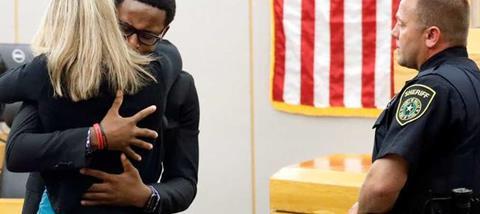
I am not sure how I would respond to the racist killing of someone I love – I pray that I never have to find out.
What we have seen in the story of the murder of Botham Jean while unarmed in his own home is not surprising when we consider it in the wider context of how black people are seen as ‘other’ and as a ‘threat’ in white majority societies.
While we could rely on many anecdotal stories of black people being stopped by police on suspicion of stealing the car they are driving (and which they own), or white women clutching their handbags as black men sit near them on public transport, we do not need to, because the statistics speak for themselves. Black men are imprisoned for longer than their white counterparts for the same crimes – and that is here in the UK, before we dismiss this as an American problem.
Forgiveness
The response of Brandt Jean to his brother’s death was astounding. The video of him offering Christian forgiveness and an embrace to Amber Guyger, the woman that shot Botham, went viral (see below).
Christians were quick to describe it as a “beautiful Christian testimony, truly salt and light in a dark and twisted world” (I will only point out the unfortunate use of ‘dark’ alongside ‘twisted’ in a story about blackness, racial profiling and racial violence as this itself requires another article). The bigger question for me is whether this response is really the Christian one or simply the one that most Christians are comfortable with.
I must be clear that I am in no way attempting to undermine the response that Brandt Jean has given. Only God knows their suffering, and how this act of forgiveness will offer healing in the midst of this trauma. I am writing for those of us onlookers, especially those who may be tempted to use this example going forward.
Christians in different places and traditions have always emphasised particular aspects of Christian doctrine. These attempts to understand and speak faithfully about who God is and what he wills, have never been perfect because humans have hidden agendas, a predisposition to power trips, prejudice and limited perspectives.
This is particularly pertinent when we consider Christianity as it formed historically in Europe. Colonial forms of Christianity were used as a tool to oppress enslaved Africans and to maintain power in the hands of their ‘masters’. Sermons told slaves to work hard, focus on personal piety, wait for heaven and forget about liberation in the here and now. As a result, these women, men and children made in the image of God accepted their state as the will of God, reinforced by European priests and overseers. The Good News Jesus came to bring to the poor was denied.
Colonial theology
Such colonial theologies remain alive and well. They rear their ugly heads particularly when questions of social injustice and political action arise. They tell those who are oppressed or victimised by unjust systems to stay silent and wait for God, to forgive and let go - because the only truly Christian response is forgiveness.
We are called to forgive. But the Christ-like response does not end there. We are called not only to forgive sin within an unjust system, but to resist and protest against systems which give rise to such sin.
Jesus lived a life of resistant to evil in all of its forms. He was intent on bringing an end to sin and death through his life, death and resurrection – not just personal, individual sin, but the sin of communities, nations and the world.
Jesus was unafraid to challenge Pharisees who put legalistic burdens on people rather than having human flourishing at the centre of their ministry. He turned the tables angrily because the people in the Temple had lost their way.
Jesus did not ‘wait’ when it came to calling out evil in institutions and systems. This was his ministry. What might this Jesus have to say to Botham Jean’s family, the woman who murdered him and a justice system that so rarely brings about justice for the poor and minorities?
This challenges those of us who are affected by colonial forms of theology, who, in Martin Luther King’s words, prefer “order over justice” even when that order is unjust and, therefore, is really disorder in God’s eyes.
It is a call to repentance for all the ways that we may benefit from and participate in narratives and systems which see people of colour as inferior and less deserving of respect and human dignity than those who are white.
It is a reminder that the work of the Spirit does not simply lead us to forgive, but to proclaim good news to the poor, free prisoners, give the blind their sight, set the oppressed free and proclaim the year of the Lord’s favour.
Selina Stone is a tutor and lecturer in Political Theology at St Mellitus College
Premier Christianity is committed to publishing a variety of opinion pieces from across the UK Church. The views expressed on our blog do not necessarily represent those of the publisher.



























